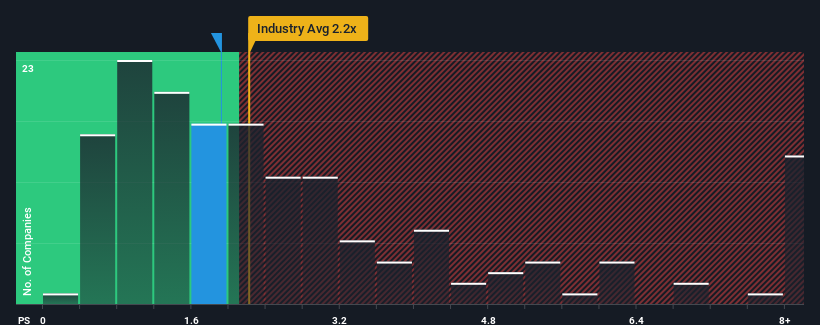Ubiquitous AI Corporation (TSE:3858) Shares May Have Slumped 35% But Getting In Cheap Is Still Unlikely
The Ubiquitous AI Corporation (TSE:3858) share price has softened a substantial 35% over the previous 30 days, handing back much of the gains the stock has made lately. Still, a bad month hasn't completely ruined the past year with the stock gaining 28%, which is great even in a bull market.
Although its price has dipped substantially, there still wouldn't be many who think Ubiquitous AI's price-to-sales (or "P/S") ratio of 1.9x is worth a mention when the median P/S in Japan's Software industry is similar at about 2.2x. While this might not raise any eyebrows, if the P/S ratio is not justified investors could be missing out on a potential opportunity or ignoring looming disappointment.
View our latest analysis for Ubiquitous AI

How Has Ubiquitous AI Performed Recently?
Ubiquitous AI certainly has been doing a great job lately as it's been growing its revenue at a really rapid pace. Perhaps the market is expecting future revenue performance to taper off, which has kept the P/S from rising. If you like the company, you'd be hoping this isn't the case so that you could potentially pick up some stock while it's not quite in favour.
We don't have analyst forecasts, but you can see how recent trends are setting up the company for the future by checking out our free report on Ubiquitous AI's earnings, revenue and cash flow.How Is Ubiquitous AI's Revenue Growth Trending?
In order to justify its P/S ratio, Ubiquitous AI would need to produce growth that's similar to the industry.
Retrospectively, the last year delivered an exceptional 47% gain to the company's top line. The strong recent performance means it was also able to grow revenue by 40% in total over the last three years. Therefore, it's fair to say the revenue growth recently has been superb for the company.
Comparing that to the industry, which is predicted to deliver 15% growth in the next 12 months, the company's momentum is weaker, based on recent medium-term annualised revenue results.
With this information, we find it interesting that Ubiquitous AI is trading at a fairly similar P/S compared to the industry. It seems most investors are ignoring the fairly limited recent growth rates and are willing to pay up for exposure to the stock. They may be setting themselves up for future disappointment if the P/S falls to levels more in line with recent growth rates.
What We Can Learn From Ubiquitous AI's P/S?
With its share price dropping off a cliff, the P/S for Ubiquitous AI looks to be in line with the rest of the Software industry. We'd say the price-to-sales ratio's power isn't primarily as a valuation instrument but rather to gauge current investor sentiment and future expectations.
Our examination of Ubiquitous AI revealed its poor three-year revenue trends aren't resulting in a lower P/S as per our expectations, given they look worse than current industry outlook. When we see weak revenue with slower than industry growth, we suspect the share price is at risk of declining, bringing the P/S back in line with expectations. Unless there is a significant improvement in the company's medium-term performance, it will be difficult to prevent the P/S ratio from declining to a more reasonable level.
Before you settle on your opinion, we've discovered 3 warning signs for Ubiquitous AI (2 are a bit unpleasant!) that you should be aware of.
If strong companies turning a profit tickle your fancy, then you'll want to check out this free list of interesting companies that trade on a low P/E (but have proven they can grow earnings).
New: AI Stock Screener & Alerts
Our new AI Stock Screener scans the market every day to uncover opportunities.
• Dividend Powerhouses (3%+ Yield)
• Undervalued Small Caps with Insider Buying
• High growth Tech and AI Companies
Or build your own from over 50 metrics.
Have feedback on this article? Concerned about the content? Get in touch with us directly. Alternatively, email editorial-team (at) simplywallst.com.
This article by Simply Wall St is general in nature. We provide commentary based on historical data and analyst forecasts only using an unbiased methodology and our articles are not intended to be financial advice. It does not constitute a recommendation to buy or sell any stock, and does not take account of your objectives, or your financial situation. We aim to bring you long-term focused analysis driven by fundamental data. Note that our analysis may not factor in the latest price-sensitive company announcements or qualitative material. Simply Wall St has no position in any stocks mentioned.
About TSE:3858
Ubiquitous AI
Provides software products primarily in Japan and internationally.
Excellent balance sheet with acceptable track record.
Market Insights
Community Narratives



